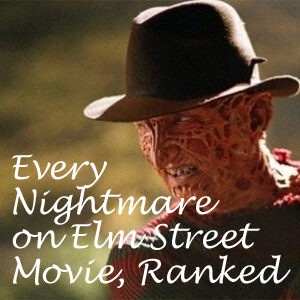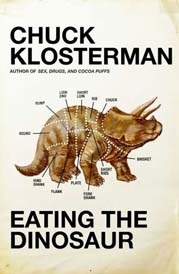There aren’t many things I enjoy more than cracking open a new book of Chuck Klosterman essays. I read his latest volume, “Eating the Dinosaur,” in two sittings; it would’ve been one sitting, but I had to go to work in between.
Klosterman has always been a zesty writer, but this book — his sixth overall and fifth nonfiction book — is his most polished work. (Because I grew up in Fargo, N.D., where Chuck covered entertainment for the local paper, I’ve had the privilege of following his professional career since the beginning. I don’t spend much time thinking about my influences, but Klosterman is almost certainly my biggest influence. His work seemed to say, “Writing can be fun, and also have something to say.” It’s likely that my best blog posts have elements of Klosterman. I can tell we are very different people, but we are also exactly the same.)
“Eating the Dinosaur” is Klosterman’s most thoughtful, insightful work (although I also smiled a lot while reading it). In the past, the way he brought out details about pop culture from our childhoods (“Saved by the Bell,” hair metal, the Celtics-Lakers rivalry) was the real joy, and then there was a nice touch of insight as a bonus.
Now the insights are front and center. He still uses pop culture as a springboard, but his ideas really sparkle now, and he has a great knack for picking the right topics to begin with.
Here are the topics Klosterman tackles in “Eating the Dinosaur”:
- Why people feel compelled to answer interview questions, even when it might get them in trouble. Obviously, it’s the inviting personality of the interviewer, so that’s not really news to me, but I don’t mind it when Chuck confirms something I already know.
- Why some moderately successful athletes are labeled as busts because they “should have” been great but weren’t, while other completely unsuccessful athletes are celebrated because they “could have” been great but weren’t. Klosterman’s examples are (on one side) Ralph Sampson, who was supposed to be the greatest player ever and turned out to be only very good, and (on the other side) Benny Anders, who made a spectacular dunk in an NCAA tournament game, but never bothered to refine his talent.
- Voyeurism, specifically how watching someone who doesn’t know we are watching them is more thrilling than watching, say, “The Real World.” This is despite the fact that TV is naturally more entertaining than reality. But, Klosterman argues, only reality gives us that sense that literally anything could happen. (A favorite sentiment of Klosterman’s is, “Actually, the opposite is true.” It’s remarkable how often what we assume to be true in life is actually the opposite of the truth, and no one explores this phenomenon better than Klosterman.)
- The thought process of Garth Brooks when he launched his alternate personality of Chris Gaines. Klosterman argues that rather than wanting to escape fame (as Stephen King did with Richard Bachman), Brooks wanted to see if he could make lightning strike twice.
- Why he loves the NFL. I kind of hate people who love the NFL (especially if they didn’t love it to this degree 15 years ago — and that covers every NFL-lover I know), but at least Klosterman admits that he has jumped on this “professional football is best part of being alive” bandwagon. But his knowledge of the history of play-designing innovation is impressive, and he also likes college football, so he’s forgiven for his insane addiction.
(On a side note, the main reason I hate the NFL is the coaches. I might consider embracing a team coached by someone who acts more like a baseball manager — i.e., treating his players decently; being relatively friendly with the media; and generally being happy that he has an amazingly cool and high-paying job. You know how Fox does brief manager interviews in the middle of the game? This would never happen in the NFL, even if the job demands of the coach didn’t preclude it. This is because the NFL is a league of imitators, and since Bill Belichick was a jerk when he won those Super Bowls, now every coach is a jerk. [They’re just not as good at cheating as he was.])

- Laugh tracks. It’s not a new observation to say that the good sitcoms don’t have laugh tracks and the bad ones do have laugh tracks. But Klosterman goes deeper to explore how laugh tracks have conditioned our behavior. A great observation is that people in other countries don’t do the “polite conversational laugh” that we Americans (even me, to some degree) do subconsciously. I kind of want to stop doing the polite laugh now to avoid being phony, but I’m also afraid people (other Americans, anyway) will think I’m a jerk.
(Klosterman lists non-laugh track shows, and I wasn’t surprised to realize I loved most of them. Then he mentions laugh track shows, and I was someone taken aback to realize “Seinfeld,” which I thought I loved, is among them. Maybe this is why I can get absorbed in a “Simpsons” rerun on its own merits, but with “Seinfeld” I just get nostalgic and think, “You know, that was really funny at the time.”)
- Literalism. This essay struck close to home for me, as Klosterman shows how literal people are not understood by a society where casual lying and half-truths have become the expected form of communication. He crystallized why I like Ralph Nader and Kanye West as people even if I don’t agree with their views; I am not threatened by literal talk and behavior, because that’s the way I behave, too (and it’s gotten me into a lot of trouble, almost all of which — I now realize — was completely unjustified, and I sympathize with other literal people who are ostracized). I’m glad Chuck’s on my side on this one.
(The Kanye West reference is mine, not Klosterman’s — he uses Nader as the example of the blunt truth-teller who many people label as insane [when it is more likely, I now believe, that the world is insane]. I probably should’ve posted this when it was newsworthy, but I feel like I’m the only person on the planet who understood West’s interruption of Taylor Swift to praise Beyonce at the Grammys. It was rude, of course; I’m not saying it wasn’t. But it was also completely human, and I think it’s shameful and ridiculous that so many of us can’t forgive another human being for being human.)
Even on the essays where I knew where Chuck was going, I still enjoyed the ride. For example, I immediately got what he was saying in the Sampson essay, and I knew it required more words because it was a tricky issue to clarify, but in the meantime, I enjoyed learning a lot about the Houston Cougars of the early 1980s.
Klosterman doesn’t really pin down what this book is about, but it struck me as an exploration of how we perceive things and how those perceptions aren’t necessarily good for us. It encourages thinking for yourself — it makes free thinking seem like the most amazing thing we could achieve, just by following where Chuck’s brain takes him — and yet it also illustrates how difficult independent thought is in this media-saturated, Internet-driven 21st century. Despite that, “Eating the Dinosaur” is not depressing. It is damn entertaining, though.

